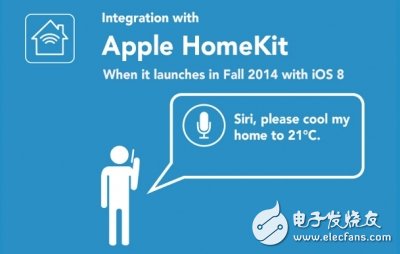A few days ago, foreign media reported that Apple has officially completed the customization of its HomeKit hardware specification standards, and will be fully open to smart home device partners through the MFi licensing program. Device manufacturers can join the program to launch smart home products for Apple's iPhone, iPad and other devices.
In fact, when Apple introduced the HomeKit platform, there were already peripheral manufacturers that could not wait to launch related products, but HomeKit was still in the testing stage. Today, Apple has finally completed HomeKit and officially provides it to all partners through the MFi program.
First, each is a smart home
Smart home is not a new thing. As early as 10 years ago at the electronic exhibition, we have already seen home appliances such as Haier and Hisense pushing this concept. At that time, there were no smartphones today, and wireless routers for homes were not popular. The smart homes we saw in the past were very low-level and even had SMS control methods.

Later, with the emergence of smart phones, 3G, 4G high-speed networks, and home WIFI, smart homes have control terminals and network foundations. And cheaper embedded chips make smart homes no longer expensive. After Google bought Nest at a high price, the development of smart homes once reached a climax. Samsung, LG, Haier, TCL, home appliance manufacturers, Internet vendors such as Google and Baidu, Xiaomi, a smart phone manufacturer, Huawei and ZTE, a communication device manufacturer. Intel, Qualcomm, such chip makers have begun to get involved in smart home devices.
There are only a few standards for smart homes. Samsung, Intel Dell and other companies have jointly established the Intelligent Home Equipment Standard Alliance OIC; Qualcomm, Sharp, LG, Cisco Microsoft and other companies have set up another home equipment standard alliance AllSeen; Samsung, ARM and Four companies such as Nest jointly launched a new standard Thread for wireless mesh networks used by smart homes...
But these seemingly extremely powerful alliances did not bring us products, and Apple decided to take the shot.
Second, Apple's appeal
Since the release of the iPhone, Apple has re-emerged as a super giant in the industry in a few years. The idea of ​​soft and hard integration allows Apple to be the maker of industry standards. The world's billions of iPhones and iPads with IOS systems have given Apple hardware access.
Other manufacturers do smart homes, taking into account the different terminals in the user's hands, different hardware, different operating systems. Apple's leading standards are Apple's own hardware platform and its own operating system. As long as third-party vendors test Apple's platform, they can guarantee the experience of hundreds of millions of potential users around the world. This appeal is unmatched by other companies.
Compared with Samsung, LG, Haier and other home appliance companies, Apple itself does not manufacture home appliances, is not a competitor of the industry, standing in the detached attitude of third parties, and formulating standards to obtain revenue. Only Apple, such a manufacturer, can truly formulate smart home standards and unify the smart homes that have been fighting each other.
Third, the era of smart home really opened
Apple has scheduled to hold its first MFi Summit in China from November 12th to 14th. A large number of vendors will be present and present with external devices compatible with iOS 8 and HomeKit platforms.
As a big country in the manufacture of home appliances, various manufacturers are eager for someone to develop a standard that everyone recognizes, so as to facilitate product development and promotion. In terms of experience, smart home products are more convenient and more enjoyable than traditional home appliances. In terms of cost, with the price reduction of various microelectronic accessories, it will not increase too much.
In the peripheral network, the control terminal is early, the conditions required for smart home have long matured, and the lack of is a recognized standard, and Apple is qualified to introduce this standard by virtue of its appeal and products.
Apple HomeKit has put forward a series of requirements covering Bluetooth (BLE) pairing, security and communication, as well as the provision of HomeKit peripherals based on WiFi connection. The HomeKit Peripheral Protocol contains configuration information for many smart home devices such as fans, garage doors, lights, locks, power outlets, digital switches, and thermostats. Basically covers possible smart home products and can be continuously expanded.
The completion and promotion of the HomeKit standard will truly open the era of smart home in human society.
When it comes to heating or cooling a car themselves, they usually fit a blow heater or fan into a window, seal it up, and just pump hot or cool air from a stationary or big wheeled heater. Conclusion At the end of the day, if you live in a climate where you really need to quickly heat or cool your vehicle, it`s worth the expense of an inline heater , and the labor to have a professional install it.
Car Heater, Car fan, Car Defogger,Windshield Defroster Plugs into Cigarette Lighter, Auto Electronic Heater Fan Fast Heating Defrost 12V 130W Heating Cooling 2 in 1 Function
Welcome OEM with CE/ROHS/TUV approval
thanks
12V Car Appliances
Fenry manufacturing Co., Ltd , https://www.cnfenry.com